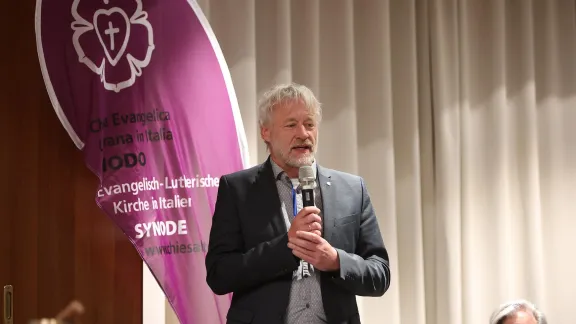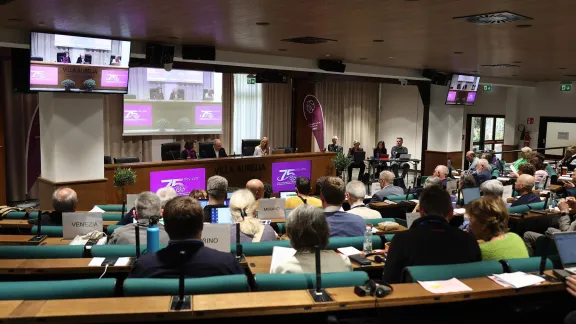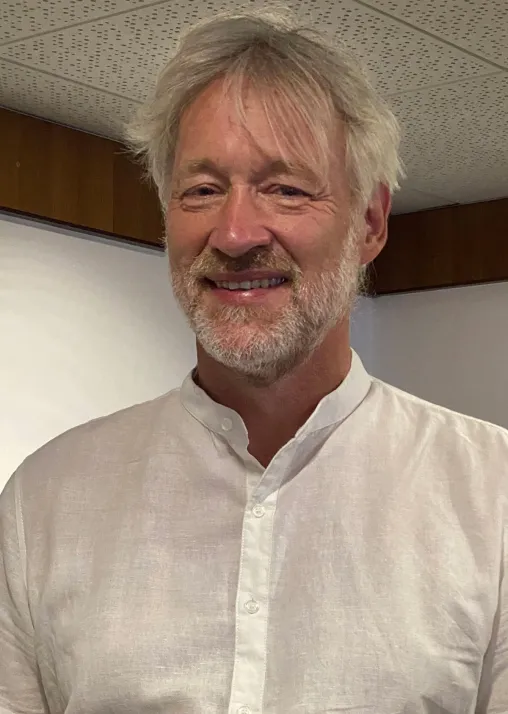
Dean Carsten Gerdes speaks during the CELI Synod in Rome. Photo: CELI
The Evangelical Lutheran Church in Italy marks 75th anniversary and five centuries of historical presence
(LWI) - The Evangelical Lutheran Church in Italy (CELI) is currently marking the 75th anniversary of its foundation with the goal of making its rich history and diverse communities “better known and more visible” within the majority Roman Catholic context. The anniversary was celebrated during a series of public events that were held during the recent Synod, which took place at the end of April in Rome.
The church was officially founded in 1949, with the help of the newly established Lutheran World Federation (LWF), to support German Protestants who were struggling in the wake of the Second World War. But the history of Lutherans in Italy can be traced all the way back to the Reformation, notes Rev. Carsten Gerdes, Dean of the national church and pastor of the Ispra-Varese community on the Swiss-Italian border.
While we are celebrating our 75th anniversary, we are also celebrating 500 years of history here in Italy.
Rev. Carsten Gerdes, Dean of CELI and pastor of the Ispra-Varese community
“Our oldest community is in Venice, where they have two letters written by Martin Luther himself to Protestant merchants in the region,” Gerdes explains. Known as the Serenissima, the Venetian Republic of the 16th century was a cosmopolitan and flourishing center for trade, as well as for the cultural and religious innovations that were introduced by scholars from northern European countries.
Although not as renowned today as Gutenberg’s movable-type printing press in Germany, Venice was also one of the most important publishing centers of that period and many of the Reformers’ early writings were printed there, often in an easily portable paperback format. “So, while we are celebrating our 75th anniversary, we are also celebrating 500 years of history here in Italy,” Gerdes says.
Today the CELI includes 15 communities, located the length and breadth of the Italian peninsula, from Trentino-Alto Adige which borders Austria and Switzerland in the north, to the Mediterranean island of Sicily in the south. While some communities have several centuries of history, others, such as Verona, Merano and most recently Turin, were founded less than two decades ago.
“Like almost all the other churches in Europe, our numbers are shrinking,” Gerdes reflects, adding that the anniversary is an opportunity to make the Protestant presence better known for its distinctive form of Christianity. “95 percent of Italians, when asked about Christianity, will think only of the Roman Catholic Church, so this is an opportunity for us to show that there are other varieties too,” Gerdes says.

Participants at the CELI Synod marking the 75th anniversary of the church. Photo: CELI

Rev. Carsten Gerdes, Dean of the Evangelical Lutheran Church in Italy (CELI). Photo: CELI
Stronger together as people of faith
Relations with Roman Catholics are “easy, friendly and respectful at local level,” says Gerdes, who was recently part of an LWF leadership delegation meeting with Pope Francis in the Vatican. Noting that the pope urged Christians to “walk together, pray together and do charitable work together,” he says believers of different traditions should also “talk more together about our faith and about the practical challenges such as war and peace, how to live better together as neighbors.” It is important to meet each other as people of faith because together we can be much stronger,” he insists.
Since its earliest beginnings, the Lutheran church has seen itself as a “home from home” for Germans or other German speakers living and working in Italy, but today those cultural and linguistic dynamics are changing, Gerdes continues. “We now have one community founded by an Italian minister and at least three others where the main language is Italian.”
“I think our future will be more Italian than German, so our aim is to open our doors, to invite people in, to pray and to discuss together about the challenges our society is facing,” Gerdes adds.
One practical way the church aims to attract more interest is by offering small grants to 20 local organizations to support their diaconal, educational or other social work. “We hope that people will see our name or our logo and be curious to find out more about who we are and what we do,” Gerdes concludes. “We are planting these small seeds in the hope they will bear much fruit for the future.”


